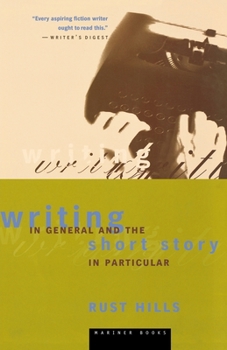Writing in General and the Short Story in Particular: An Informal Textbook
Select Format
Select Condition 
Book Overview
Here is a practical guide to writing short stories that explains all the essential techniques of fiction - from character and plot to flashback and foreshadowing - in a way that is both understandable and useful to the beginning writer. Long considered a classic in the field, WRITING IN GENERAL is the product of a lifetime of reflection by one of our best literary minds.
Format:Paperback
Language:English
ISBN:0618082344
ISBN13:9780618082346
Release Date:September 2000
Publisher:Houghton Mifflin
Length:208 Pages
Weight:0.55 lbs.
Dimensions:0.7" x 5.5" x 8.5"
Customer Reviews
5 ratings
For My Money the Best Book on Writing Ever Written
Published by Thriftbooks.com User , 22 years ago
If you have to read one book on writing, pick Writing in General and the Short Story in Particular. It matters not if you are an aspiring fiction writer or craft journalistic feature stories, you will savor the time spent with Rust Hills book. This is a practical writing guide. It explains in an understandable fashion all the techniques of fiction - from Character and Action, Foreshadowing and Suspense to Irony and Point of View in a simple and useable fashion. Using experience cultivated over more than 20 years as the Feature Editor of Esquire Magazine, Hills organizes the information in an ingenious fashion. Each chapter not only explains, but also employs the particular technique to demonstrate how it works. Hills amplifies his thoughts with insightful comments on many of the enduring theorists and practitioners of the craft. My only regret is that it is easier to read about the techniques that to translate them into working stories.
A book worthy of review.
Published by Thriftbooks.com User , 24 years ago
Tools of the MuseIn his informative and entertaining book,Writing in General and the Short Story in Particular, Rust Hills sets out to reach a broad range of potential writers. He attempts to establish a basic guide, useful to the nascent writer working in a workshop environment and to the solitary writer, who wishes "to learn to read literary stories in such a way as to help...write them." Hills' main idea that he stresses throughout the book revolves around the interrelation of every element within a short story. He writes: "A successful short story will thus necessarily show a more harmonious relationship of part to whole, and part to part...Everything must work with everything else. Everything enhances everything else, interrelates with everything else, is inseparable with everything else- and all this is done with a necessary and perfect economy." Hills formats the book so that each of the major literary terms and devices, essential to the short story writer, receive its own section for deeper analysis. Within these ongoing essays he often uses simplified fictional characters of his own invention to illuminate the discussion at hand. The characters, "Martin" and "Miranda," grow irksome at times, but his point is to make sure the reader unquestionably comprehends. Most of the sections close with a statement that reiterates how the specific device or term fits into the overall design of the whole. He pounds this notion of interrelation into the reader's head. Hills presents a vast array of useful literary terms and devices in a manner that never hinders the logical sequence of the book. His witticisms and fresh style of economic prose help to maintain the momentum and readability through the weighty, technical material. He differentiates the short story from the novel or the sketch. He touches upon the spectrum of characterization: the type as opposed to the stock character, the fixed compared to the moving character. He spends a great length discussing the origin, the meaning, and the contemporary interpretation of every beginning writer's worst enemy, that ill-fated, e-word, "epiphany." Point-of -view, "the most important decisions about techniques" that a writer has to make also receives extensive attention in the book. Hidden within Hills' rich sea of information are some tidbits and treasures from the great masters of the profession. He cites Edgar Allen Poe in the analysis of the short story versus the sketch or novel. Poe writes of a " single and unique effect" to which every word of a short story should lead: "If his (the author's ) very initial sentence tend not to the outbringing of this effect, then he has failed in his first step. In the whole composition there should be no word written, of which the tendency, direct or indirect, is not to the one pre-established design." To shed light on the discussion of the epiphany, Hills relies upon the man who originated the term
Clearly explains what makes a good short story
Published by Thriftbooks.com User , 24 years ago
This really is the best book on short story writing out of the couple of dozen I've read. Lucidly explains what makes a good short story. It's more of an examination of good fiction than a how-to, but it's incisive and valuable. If I could have only one book on writing, this would be the one.
An informative read.
Published by Thriftbooks.com User , 25 years ago
This book puts to shame much of what's out there in terms of "self-help" writers books. It elaborates on the shortcmings of "slick fiction" as well as outlines the essential ingredients for quality literature.
Single best source for any starting writer;amazingly helpful
Published by Thriftbooks.com User , 27 years ago
Rust Hills has created a reference that is valuable for even the most experienced writer. His expertise in the short-story, after years of editing The Esquire, has allowed him a unique ability to point out those simple things that are the most complicated for writers and offer helpful advice in the correction of these concerns. A brilliant read for anyone interested in writing




